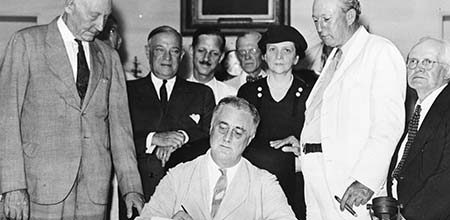Achieving a Better Life Experience (ABLE) Act
Categories: Finances
The Stephen Beck Jr. Achieving a Better Life Experience (ABLE) Act (Public Law 113-295) was signed into law by President Barack Obama on December 19, 2014. The ABLE Act amends Section 529 of the Internal Revenue Service Code of 1986 to allow individuals with disabilities to establish tax-advantaged savings accounts. The funds in an ABLE account do not impact eligibility for most public programs, and accounts may be used to pay for a broad range of needs. There are a few important facts to know about ABLE accounts:
Who is eligible?
An ABLE account may be established by or for any individual who was disabled before age 26, even if the person is now older. Individuals who currently receive Supplemental Security Income (SSI) or Social Security Disability Insurance (SSDI) are automatically eligible if they meet the age requirement. Individuals who have “significant functional limitations” as defined by the Social Security Administration and receive a letter of certification from a licensed physician may open an account if they became disabled before age 26.
How much money can be put into an ABLE account?
Anyone can contribute to an ABLE account – individuals with disabilities, family members, or friends – but the total amount contributed by all parties is limited to $14,000 per tax year. (This amount is subject to adjustment for inflation.) The maximum amount that can be contributed over time varies by state. Contributions to ABLE accounts are not tax-deductible, but the account holder does not pay tax on the income earned by the account.
How does an ABLE account affect other benefits?
For most people, opening an ABLE account will not impact eligibility for SSI, Medicaid, or any other public program that is means-tested. However, when an ABLE account exceeds $100,000, the account holder’s SSI cash benefit is suspended until the account falls below that amount. The suspension of SSI does not affect Medicaid eligibility. However, when the account holder dies, the state may file a “Medicaid Pay-Back” claim to recoup health care expenses from the time the account was opened.
Where can accounts be opened?
A technical fix to the federal law was made in 2015 to allow individuals with disabilities to participate in an ABLE program even if they don’t live in the state where the program is located. However, some states have residency requirements.
How can ABLE accounts be used?
ABLE accounts can be used for any “qualified disability expense,” which is just about any expense that results from having a disability. These include education, housing, transportation, employment training and support, assistive technology, personal support services, health care expenses, financial management and administrative services, legal fees, funeral and burial expenses, and other expenses that improve health, independence, and/or quality of life.
ABLE accounts give individuals with disabilities flexible savings tools with more control and at a lower cost than trust accounts or similar programs. To learn more, visit the ABLE National Resource Center, operated by the National Disability Institute.




